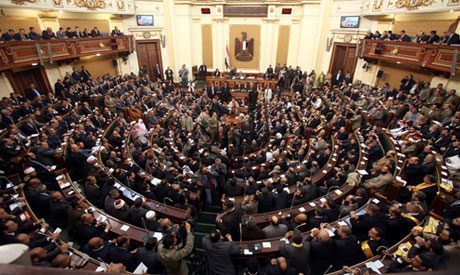
Under Abdel Fattah al-Sisi’s military regime, prominent political opposition as the Muslim Brotherhood and their grassroots activists are imprisoned, growing media is censored, and journalists and human rights activists are repressed.
However, one of the few formally tolerated avenues of opposition is smaller opposition political parties in Egypt. But most of them have remained silent in their dissent, allowing the regime led by Abdel Fattah el-Sisi to sideline them.
Those parties failed to unite adequately and coordinate campaigns against the regime further dampens prospects of substantive political change.
Carnegie Endowment published a report titled: “Egypt’s Loyal Opposition” on the history and the role of these small parties in Egypt’s political life.
In 2016, Egypt’s smaller secular political parties, most of whom are secular and left-leaning on social and economic issues, failed to win any seats in 2015’s parliamentary elections.
Some parties boycotted the elections over their lack of resources and claims that electoral laws disadvantaged smaller parties as the Dostor Party and the Bread and Freedom Party.
The Egyptian Social Democratic Party (ESDP)—a new post-2011 party that emphasizes the importance of youth participation and focuses much of its outreach on university campuses—won just four seats. Tagammu—arguably Egypt’s oldest opposition socialist party, yet which has long been viewed by workers as an empty shell co-opted by the regime—secured only two seats.
According to Carnegie report, one of the reasons behind their failure is “the broader trend of political disengagement. Indeed, the incredibly low 28-29% turnout for 2015’s general election highlighted growing apathy in general.” No doubt that part of the discontent is with al-Sisi’s administration over increased state repression, economic mismanagement, and ongoing security issues.
“However, the parties failed to translate popular discontent into votes, especially in the 2015 elections, when many Egyptians feared a parliament dominated by pro-regime parties like the Free Egyptian Party, Future of the Nation, and Wafd—an outcome that occurred nonetheless, “said Carnegie.
Nowadays, the secular parties are trying to balance their overwhelming exclusion from parliament while seeking to remain politically active. However, their biggest ongoing challenge is their relationship with Abdel-Fattah Al-Sisi and the military-dominated political elite.
In in 2012 and 2013,all secular parties were united through the National Salvation Front—despite ideological differences among leftists, liberals, socialists, Nasserists, and others – to oppose President Mohamed Morsi due to their collective fear of Islamism and Muslim Brotherhood dominance .
But when al-Sisi reached power, they were divided internally and among other parties on whether to support, remain neutral, or oppose the regime. Most continue to opt for neutrality and tacit support. For example, during the leadership vote for the ESDP in April, two candidates who favor greater opposition to Sisi, Farid Zahran and Bassem Kamel, narrowly won—by just four votes out of the 800-member general congress—over their competitors who advocate supporting Sisi,” said Carnegie.
As a result, Carnegie states in its report that opposition parties are largely playing the role of “loyal opposition” in Egypt, as they did in Mubarak’s days.
“They are reinforcing a state that tolerates legal opposition parties but ensures they cannot attain power or threaten the status quo. In turn, these parties recognize their position of weakness and avoid launching anti-regime campaigns,” reported Carnegie.
The new Egyptian parliament works in al-Sisi’s favor as it allows him to institutionalize some parties by incorporating them in the formal political arena and distract and divide the leftist opposition which failed to make electoral headway.
One of the few opposition cooperation against Sisi is the “Egypt is not for sale” campaign opposing the transfer of the Tiran and Sanafir islands to Saudi Arabia.
Egyptian protests against the transfer of Tiran and Sanafir islands to Saudi Arabia. Massive protests started on April 15 known “by Land Friday” reportedly the largest in two years and presented “the most significant public challenge” to al-Sisi since 2013.
Despite , Dostor, ESDP, the Social and Popular Alliance Party (SPAP), and Bread and Freedom capitalized by jointly opposing the transfer while demanding democratic reform and condemning police brutality and arrests.
“However, most parties resisted opposing Sisi directly even during this massive outpouring of public criticism, limiting their cooperation prospects of gaining regime concessions,” said Carnegie.
As a result of this disunity, the “Egypt is Not for Sale” campaign had seemingly fizzled out as of early June, with participant parties again becoming silent. Even some camps supported Sisi and attacked fellow members of the opposition. For instance, Tagammou attacked and accused protesters with left background of participating in in the “hostile of U.S and western plot” and fostering national chaos.
On the other hand, civic organizations played a major role in leading the public demonstrations and presenting a more unified front in the campaign, bringing together journalists, lawyers, trade unions, students, and web activists.
As a result, the administrative court nullified the agreement that transfer the two Red Sea islands to Saudi Arabia, “a decision the government has vowed to contest, can hardly be attributed to the efforts of opposition parties, “said Carnegie.
Moreover, there was other attempts effort on the unity among the opposition. The former presidential candidate and Popular Current Party founder Hamdeen Sabahi proposed on March 4, even before the “Egypt is Not for Sale” campaign, a” “Real Alternative “movement made up of smaller opposition parties to counter parliament’s alleged pro-regime bias. However, most opposition parties refused to join Sabahi, with the only noticeable participants being Sabahi’s own Popular Current and his former party Karama. Soon the initiative lost steam its aura, fearing a potential regime backlash.
Sabahi’s public criticism of Sisi, ranging from economic mismanagement to attaching personal culpability to the death of soccer fans,” likely led other parties to feel vulnerable were they to associate with him, “said Carnegie.
Fear is one of several reasons why opposition parties don’t challenge strongly al-Sisi regime at a time where human rights violations have reached one of its highest records.
Human rights violations and repression have increased exponentially since 2013, with “authorities arbitrarily restricting the rights to freedom of expression, association ,and peaceful assembly,” as Amnesty International reported.
An ESDP spokesman argued Egyptians “live in a state of constraint on the public sphere, and attacks against civil society organizations.”
In May, Dostor drafted a list of members it claimed had been forcibly disappeared, blaming the Ministry of the Interior.
“Mahmoud Abdelazeem member of Dostor’s Ismailia board was officially arrested, as was Malek Adly a human rights lawyer and member of the ESDP. Shaimaa al-Sabbagh, a member of the Socialist Popular Alliance Party (SPAP), was shot dead by police in January 2015,” said Carnegie.
As a result, the smaller parties fear to oppose the regime will unleash further retaliation through increased harassment, arrests, censorship, and even outright party proscription.
Carnegie said that “Many parties are therefore currently seeking to maintain good regime relations above developing ideological positions and programs. On the other hand—as in Mubarak’s era—there are also rewards for parties’ obedience, such as being allowed to operate legally and contest elections.”
In addition,some leftists parties are traditionally suspicious of Islamists, consider the military the lesser evil and fear that altering the status quo could give Islamists the opportunity to reenter politics. Many as well are affected by the violent political change in Libya, Syria, Yemen, and Sinai, inspiring fears that any alternative to the status quo would be extremely bloody.
In addition, these parties also know the repercussions of attacking or criticizing al-Sisi and his military regime as it “might be political suicide and would further erode these parties meager support,” said Carnegie. Since 1952, the military, which has perpetuated the image of being state guardians, has an unfair hold over Egypt’s politics and economy —despite attempts to obfuscate the issue, the military is estimated to own around 40-65% of the Egyptian economy. The parties are aware of this but they can’t face this military empire.
Despite the current trend among most of the leftists parties—to remain neutral toward the regime based on fear of the regime and Islamists, as well as popular support for the military—may seem sound for the moment, “it presents several long-term risks,” said Carnegie . As under Mubarak, Egyptians will increasingly perceive these parties as hollow shells co-opted by the regime, further eroding their support and membership.
As time passes, the political parties power will erode as parties appear hollow and shell as under Mubarak, and this will let Egyptians withdraw from their support and membership. in addition, strong criticism between parties over their relationships with the regime, as with Tagammu’s attack on the “Egypt is Not for Sale” campaign, will further obstruct cross-party cooperation in the future .
The continuous presence of these parties”loyal opposition” in this weakness will enable al-Sisi to legitimize his rule and thus it will promote his facade of a vibrant democracy and perpetuate a lack of reform.



